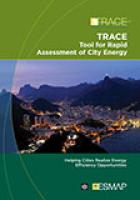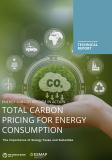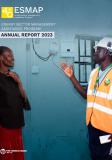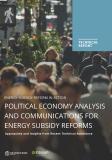Publications

Cities face the difficult challenge of maintaining economic competitiveness, and improving and expanding municipal services in the face of limited budgets. Energy efficiency (EE) can help cities relieve some of the budgetary pressure by reducing energy costs, thus freeing resources for municipal services. EE can also help improve the quality of services, such as improved lighting, transport, and building maintenance.
The Tool for Rapid Assessment of City Energy (TRACE) is a decision-support system designed to help cities quickly identify and harness EE opportunities. It targets underperforming sectors, evaluates improvement and cost-saving potential, and helps prioritize actions for EE interventions. TRACE focuses on the municipal sectors with the highest energy use: passenger transport, municipal buildings, water and wastewater, public lighting, power and heat, and solid waste.
Learn more about EECI.



